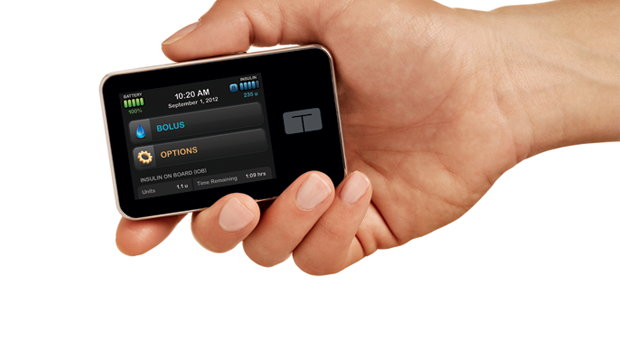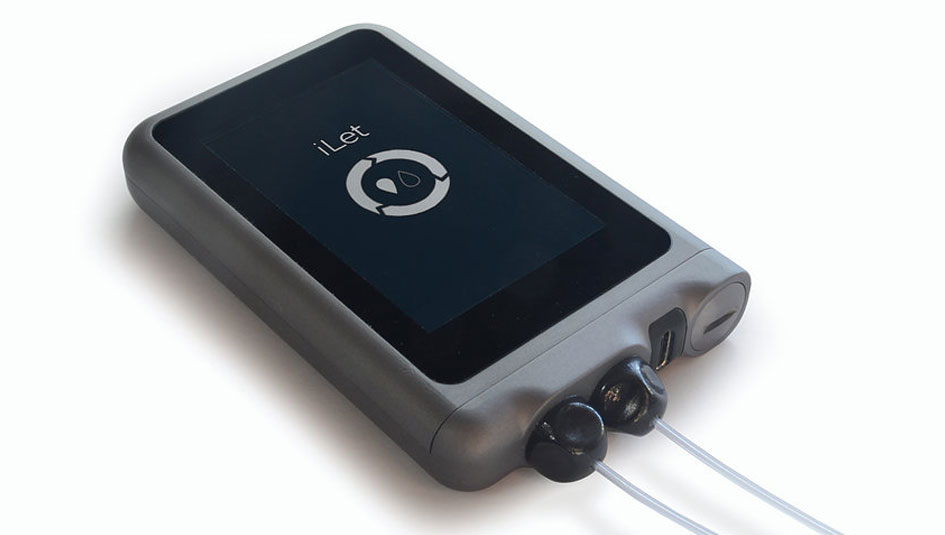
There are times when it’s not easy being a spokesperson, like when you have to stand at a podium and neither confirm nor deny the latest political scandal. And then there are times when being a spokesman is more fun, like when the insulin pump company you represent was just involved in successful trials of a closed-loop artificial pancreas system.
Steve Sabicer is experiencing the latter as spokesman for Tandem, the relatively new insulin pump company on the block. Just a few years after hitting the market with its t:slim, the company is basking in the glow of major news cycle success, as the t:slim was involved in the recent Boston University/Massachusetts General Hospital trials of an artificial pancreas system that made mainstream news.
In the experiment, two t:slims were hooked up to patients in the experimental groups, one to pump insulin and another to pump glucagon. They were then wired, using t:slim’s bluetooth technology, to talk to a Dexcom continuous glucose monitor (CGM) to adjust levels automatically. The system, controlled by modified iPhones, did a superb job controlling blood glucose levels in patients and preventing bouts of hypoglycemia, researchers reported.
Tandem has had to break into a pump market dominated by Medtronic and Johnson & Johnson, and its success in artificial pancreas trials has provided a real boost. Researchers select the t:slim for its bluetooth capability, says Sabicer. They also like the pump’s small design and touchscreen interface. He estimates that t:slim pumps are being used in about a half-dozen artificial pancreas trials across the country.
”Considering that the company has only been around for a couple of years, that’s an amazing number,” Sabicer says.
It probably was especially sweet for Tandem that their pumps were involved in dual-hormone artificial pancreas trials (some trials only focus on automating insulin delivery). Tandem has long been focused on the concept of two-hormone pump therapy, and wants its pumps to be “hormone agnostic,” says Sabicer. In 2013, the company signed a partnership with the Juvenile Diabetes Research Foundation (JDRF) to develop what is being dubbed the “t:dual”, a pump that can deliver insulin and another drug hormone. Glucagon would be the obvious candidate, but the company is also hoping the t:dual can eventually be cleared to pump other drugs, like the blood-sugar-regulating pramlintide (aka Symlin).
The Boston University and Mass General Hospital trials showed that the Tandem pumps are capable of handling a second hormone, Sabicer says. Unfortunately, drug companies haven’t yet figured out a way to create FDA-approved room-temperature-stable glucagon. In the BU/MGH trials, researchers often had to replace the glucagon being used, he says.
“The mechanics of the pump are not necessarily the limiting factor,” Sabicer says.
(Drug manufacturer Xeris is currently testing its attempt at room-temperature-stable glucagon in trials with OmniPod pumps. To learn more about that, read “Is Glucagon Ready for Primetime?”)
In the short term, Tandem will be focusing on the other strengths of the t:slim pump design, including the bluetooth technology embedded in the t:slim and the pump’s slim design. Tandem hopes to convince the FDA to allow the company to turn on the bluetooth technology, so the t:slim can talk to a Dexcom CGM in an integrated system (currently, only Medtronic has won regulatory approval in Europe for an integrated pump and CGM system, the Duo). Tandem also is working towards adding a larger insulin chamber to its pump.
As Tandem now has become a publically-traded company, Sabicer said firm timelines for next steps will be given at quarterly earnings report conference calls. The next call is scheduled for July 31st, 2014. By then, Sabicer might have even more good news to share about his company’s progress.
Thanks for reading this Insulin Nation article. Want more Type 1 news? Subscribe here.
Have Type 2 diabetes or know someone who does? Try Type 2 Nation, our sister publication.







